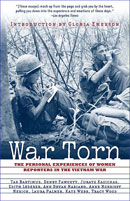Books |
War Torn: Stories of War from the Women Reporters Who Covered Vietnam
edited by Tad Bartimus
By
Published: Jan 01, 2005
Category:
Memoir
I was the college kid who got the summer job as an editorial assistant at Look Magazine. In 1966, that was a big deal. I wasn’t appropriately grateful. I wore beads and grew dope on my windowsill and tried to impress the slightly older women — that is, college grads — who worked on my floor. In my serious moments, I questioned the casualty figures that famous Americans inserted into their articles about our glorious war to defend freedom in Vietnam. Such was my modest contribution to peace that summer.
One day I looked around and noticed that one of one of those woman — a leonine beauty named Jurate Kazickas — wasn’t there any more. She’d gone to Vietnam. Later, I heard, she’d been trapped at Khe Sanh during the Tet offensive.
Flash forward 30 years. Jurate — married, a mother and a writer — now lives in my neighborhood. I see her all the time. But despite the fact that Vietnam is indisputably the central fact of the lives of everyone in my generation who still has a conscience and a pulse, despite the dozens of underlined books on my shelves about Vietnam, despite views about the government that were formed during the Vietnam war and have never really changed, Jurate and I never talk about Vietnam. I don’t think I could bear it.
It turns out that very few of the women who went to Vietnam as reporters could bear to talk about what they saw and did there. A few years ago, however, the floodgates opened, and nine women, Jurate among them, have looked back at their time at the war. The writing here has almost uniform greatness; it’s so vivid, so acute, so achingly and unflinchingly honest that it transports you across the years and miles.
That’s not just because Vietnam was the last war that allowed journalists to work without censorship. It’s also because these writers are women — they traveled with the troops, they saw their share of death, but because they could not fight or conceive of themselves as soldiers, they were forced to test themselves in other ways. At the war, Denby Fawcett says, she learned "the benefits and perils of making friends with the untamed side of yourself."
Yes, that meant just what you think: "My relaxation was friendly sex, made intense by the situation of the war." That "situation" was, of course, that brave men were fighting and dying and killing for reasons that were, for the first time in American military history, not wildly popular with the folks back home. Vietnam was thus a hell and a haven, with big learning moments out of Conrad and Crane: "In the fear of death, I felt most alive."
So, it seems, do all these women.


